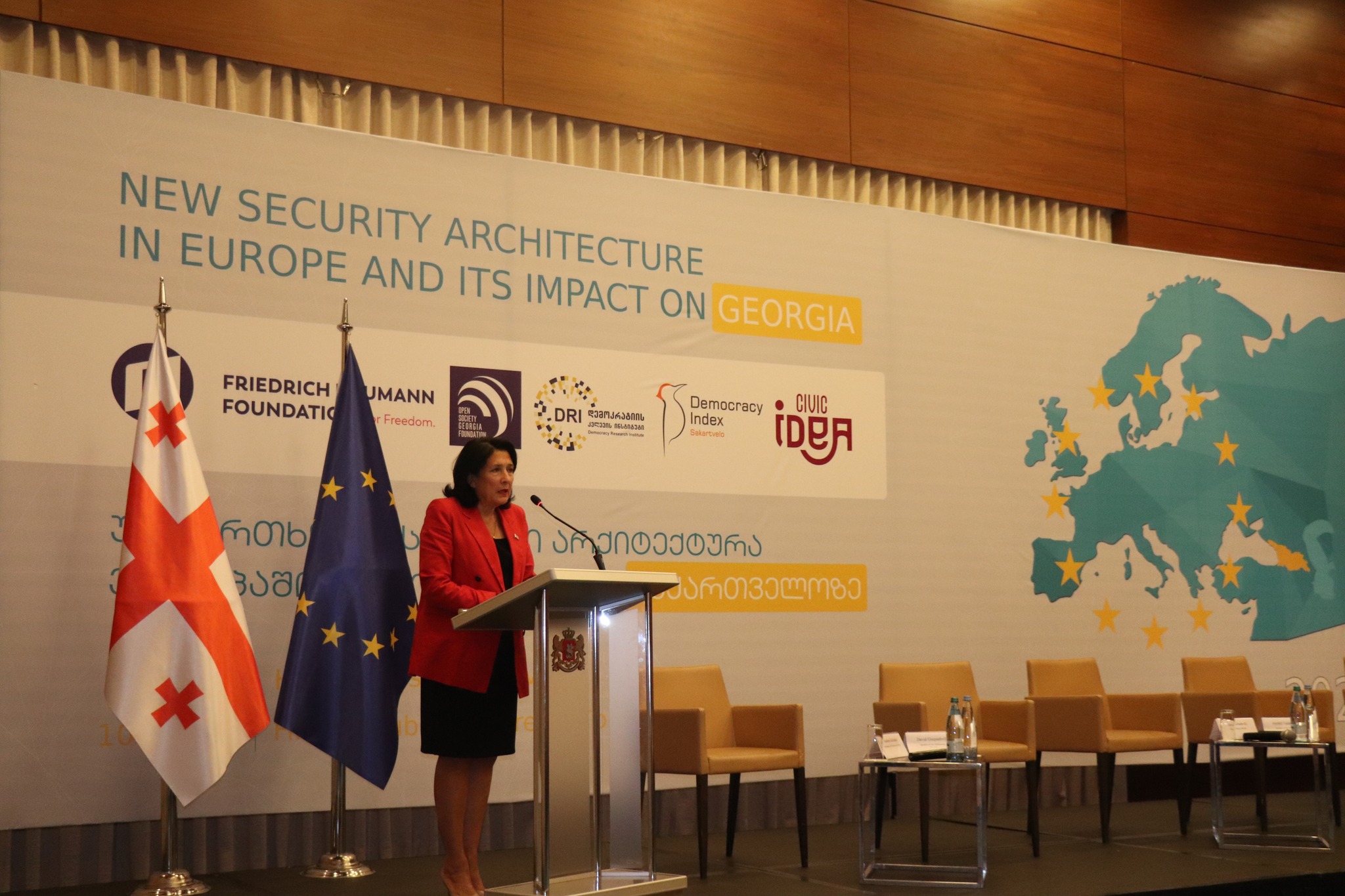EU & Georgia
Failed Presidential Impeachment Bid and Georgia's Current Path to European Integration

In September, Georgia’s ruling party Georgian Dream (GD) commenced impeachment proceedings against President Salome Zourabichvili, alleging that she breached the constitution by embarking on "unauthorized" foreign visits to the German and French heads of state, and the President of the European Council. In October, the Constitutional Court of Georgia (CCG) found that the President breached the constitution, but parliament did not remove her from office. Questions arise regarding the intentions and objectives behind this process and its possible ramifications for the quality of Georgia’s democracy and the country’s already endangered prospects of European integration.
Impeaching the Pro EU President?
President Zourabichvili initially enjoyed warm relations with the GD party. However, following Russia's aggression against Ukraine the GD party has expanded its politics of appeasement of Russia and drifted closer towards its zone of influence. In 2022, Georgia was denied the status of immediate candidate to membership upon further review.
GD has since been making domestic and foreign policy choices undermining Georgia's bid to advance to the candidate stage. Zourabichvili's public stance commenting on these moves grew more critical in tone.
In some cases, Zourabichvili took more active steps. For example, she sharply condemned the "Foreign agents" bill, and pardoned Nika Gvaramia, a prominent TV manager widely believed to be imprisoned on political grounds. However, Zourabichvili also acted with reservation, trying not to alienate the government entirely.
Despite doubts regarding her independence from the ruling party, Zourabichvili has aroused hopes among Georgia's embattled opposition and civil society. The President's allies framed the process as the "punishment" of the pro-EU President for its European stance. Others in the opposition decried the process as a regime-instigated stunt.
Instrumentalization of the Constitution
Georgia has a standard blueprint of a modern constitution, fine-tuned to run the modern ‘Plebiszitäre Führerdemokratie’. Under such systems, constitutional courts serve the needs of the ruling party and its leader, never overstepping the red lines.
Under the constitution of Georgia (Article 48), the Constitutional Court plays an important though non-final role in impeachment proceedings. At least 1/3 of MPs should support the initiation of impeachment proceedings on charges of violation of the Constitution or commission of acts containing elements of crime. CCG issues the report confirming or rejecting the impugned charges. CCG's confirmation of charges triggers an impeachment vote in the Parliament. A 2/3 supermajority vote is required to remove the President from office.
In this case, the CCG adopted a majority vote of 6 judges against three dissenting judges in favor of an impeachment process against the President. The CCG's however report is flawed, and its reasoning is marked with internal contradictions akin to the abusive constitutional review.
The CCG abdicated its interpretive authority in favor of the Parliament, holding that it is up to Parliament to set standards which constitutional violations or acts of criminal nature are sufficiently severe to mandate the removal from office. The Court limited its role to ascertaining whether a constitutional breach or act of a criminal nature was committed. The CCG reasoned that judicial finding of any constitutional breach could provide a constitutional basis for removal under the evolving constitutional standards set by the Parliament, acting within its judicially uncontrolled political discretion. This reasoning was based on textual constitutional arguments, sidestepping or ignoring normative constitutional arguments against this interpretation of the impeachment clauses.
The CCG went on to delimit Presidential powers in foreign affairs, holding that under the Parliamentary system of government, the President does not enjoy any meaningful powers in foreign affairs. The Court concluded that the President should strictly follow the government's directives in matters of foreign policy and was allowed to represent the state in foreign affairs only upon the government's express prior consent as envisaged in the text of Article 52 of the Constitution.
Despite the apparent asymmetry in constitutional foreign affairs powers of the President and the government, the CCG missed to identify the constitutional duty of cooperation between the coordinate and co-equal constitutional institutions. The Court did not inquire whether both parties followed this duty and whether there were standardized procedures in place that would ensure meaningful participation of the President in discharging powers of representation in foreign affairs.
As a result, the CCG interpreted Presidential powers and the office of the President as inferior to the government and reduced the President to a mere instrument of the government in foreign relations, which the government may employ at will. As the dissenters also underlined, such an interpretation of the Constitution grossly misunderstands the constitutional function of the President. It is based on the caricature of the doctrine of separation of powers in parliamentary systems.
What does the Failed Impeachment Achieve?
The failure of the impeachment in Parliament drew positive reactions from the EU. Therefore, it won't significantly impact Georgia's prospects of obtaining the EU membership candidacy, contrary to the claims made by the President's supporters.
The effects of the failed impeachment are intended for internal consumption. GD's alienation of the President it imposed on the Georgian electorate, could serve many internal political objectives of the ruling party. One possible use of the estranged President is to control the potential damages and benefits of the EU's forthcoming decision regarding the candidacy status.
